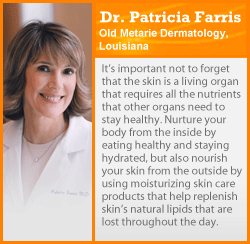Although many pregnant women seem to give off a radiant glow, not every pregnancy is a picnic for the skin.
Whether you have a history of clear skin or of regular breakouts, pregnancy can sometimes cause major acne. Your body will increase its blood volume so it can provide blood for the growing baby. However, this increase can also cause your sebaceous glands to release more oil, leaving your skin prone to breakouts [source: KidsHealth]. Problem areas are normally the face, especially near the mouth. To treat these, you can try topical over-the-counter products that are sulfur-based or that contain glycolic acid or alpha hydroxy acids. Stay away from anything with benzoyl peroxide, salicylic acid or retinoids, which can be dangerous to use during pregnancy [source: Bouchez].
Advertisement
Another major skin change that many women experience is melasma. Also known as chloasma or "pregnancy mask," melasma causes patches of darker skin to appear on the face, especially the cheeks and forehead, because of a change in hormones affecting your skin's pigmentation [source: U.S. News & World Report]. This condition can occur in up to 70 percent of pregnant women, and it's most common in women with darker complexions [source: Tunzi and Gray]. You can lessen the effects by avoiding direct sunlight and wearing sunscreen. Melasma almost always goes away after the baby is born [source: Tunzi and Gray].
More commonly known side effects of pregnancy include stretch marks on your abdomen or breasts, in addition to varicose and spider veins caused by increased blood circulation. There is a wide variety of creams and treatments available that claim to reduce the appearance of stretch marks, but they never go away completely [source: Tunzi and Gray].
Many women also experience severely dry skin during pregnancy. The worst area can be the stomach, where the dryness is caused by stretching skin and changing hormones. One of the most common dry-skin conditions is called pruritic urticarial papules and plaques of pregnancy (PUPPP), a rash that normally starts near the belly button but can spread over nearby areas. If you have an overall itchiness, that's normal, too; seek out a soothing calamine lotion or moisturizer for relief [source: Bouchez].
Although it varies, pregnancy can have lots of different effects on your skin. To learn more about them and how they can be treated, visit the links on the next page.
Advertisement


